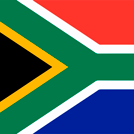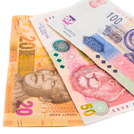|
Cape Town, South Africa
 Value Added Tax
Value Added Tax
➤ VAT is 14 percent, and it is charged on all sales.
➤ Exhibitors can avoid VAT charges on exhibit properties in some instances.
➤ VAT refunds are available and can take up to six months to be processed.
➤ South Africa participates in the ATA Carnet program.
 Voltage
Voltage
➤ Exhibit halls in Cape Town operate on 220-volt service.
➤ Electrical plugs have three round pins, and a voltage converter and adapter will be needed to use U.S. appliances.
➤ Adaptors and converters may not be available, so bring them from home.
 Garbage
Garbage
➤ Garbage handling is typically included in exhibitors' booth-space fees.
➤ Build-and-burn exhibits are uncommon, but there is no charge for their disposal so long as exhibits are dismantled and placed in an approved garbage area.
 Cellphones
Cellphones
➤ If you have a GSM-enabled phone, purchasing a prepaid SIM card from a cellular-network store is a good option.
➤ Exhibitors will need to present their passport and a letter proving they are staying at a hotel in order to purchase a SIM card.
➤ Disposable cellphones are not available to buy in South Africa.
 Shipping
Shipping
➤ Shipments by airfreight can take up to five days. Ocean freight will take roughly 35 days from the East Coast of the U.S. and up to 50 days from the West Coast.
➤ Clearing customs can require up to 10 days, but with an ATA Carnet it may be accomplished in under 48 hours. Exhibitors are advised to photograph shipped components and attach images to the customs documents.
➤ Wood containers and pallets must be fumigated or heat treated before being allowed entry.
 Emergencies
Emergencies
➤ Dial +27 (0) 21 418 2852 for the police department and 10177 for medical emergencies.
Greetings and Culture

➤ A long, firm handshake is considered important. Grasping a handshake with both hands is a gesture that will be viewed favorably.
➤ Maintain eye contact during a handshake.
➤ It is polite to wait for the most senior person to initiate greetings.
➤ When engaging in small talk, avoid race relations, politics, and poverty.
➤ Decorum is highly valued in this culture, and off-color humor may not be appreciated.
Hospitality

➤ Hospitality is not prominent on show floors in Cape Town, though large exhibits may have lounge areas where snacks and beverages are served.
➤ Popular foods include biltong and dro√ęwors (local specialties made from cured meat), tennis biscuits (coconut-flavored cookies), rusks (biscuits dipped in coffee), chips, and sandwiches. Some venues may require exhibitors to use an official caterer for hospitality service.
➤ Beverage service usually includes coffee, sodas, and bottled water.
➤ Alcoholic beverages typically aren't served in an exhibit before 4 p.m., and when they are offered, it is usually beer and wine. Special permission to serve alcohol isn't generally required, but exhibit managers should check with show organizers to be sure.
➤ Breakfast meetings are popular and will usually take place before the start of the work day. Lunch and dinner meetings are also common, though dinners tend to be more formal.
➤ Cape Town has a resident Muslim population that will frown on alcohol consumption.
Language

➤ English is spoken fluently in the business community of Cape Town.
➤ It is acceptable to print signs, business cards, and literature in English only.
Staff Attire

➤ Business suits in conservative colors are common at trade shows. Depending on the industry, business casual may be acceptable, though shirts with collars are recommended.
➤ Women should not wear short skirts or sleeveless tops.
➤ Tattoos and piercings should be covered.
Venues and Resources

➤ The CTICC ( www.cticc.co.za) has 121,000 square feet of meeting and exhibit space, and it is rimmed by an abundance of hotels and restaurants within walking distance.
➤ The International Federation of Exhibition and Event Services ( www.ifesnet.com) can connect exhibitors to a range of vendors and other resources needed for international exhibiting.
➤ The Exhibition & Event Association of Southern Africa (EXSA) represents myriad venues, exhibit houses, service companies, and industry affiliates ( www.exsa.co.za).
Installation and Dismantle

➤ There are no labor unions in the Cape Town International Convention Center (CTICC). Exhibitors may install their own displays or contract with independent labor of their choosing.
➤ Local I&D rates are generally $2 per hour for individual unskilled labor and $25 per hour for labor hired through a local exhibit supply company. The standards of the work often correspond to the rates charged.
General Facts and Tips

➤ English is one of 11 official languages in South Africa, and there may be a language barrier with hired laborers. Ensure there is a supervisor on site during install that is able to communicate in a variety of local languages.
➤ Show-affiliated hotels may sell out quickly, so book early.
➤ Exhibitors may need to pay royalties for music played in their booths at trade shows in Cape Town. Check with the Southern African Music Rights Organization for more information ( www.samro.org.za), as exhibits are likely to be policed.
➤ Most trade shows in Cape Town are open to the public. Some shows may feature "trade only" halls or days open only by invitation, but this is extremely rare.
➤ There is a lack of good public transportation in South Africa, though the CiTi airport shuttle is a convenient option for getting from the airport to downtown if you arrive during the day.
➤ Taxis are the most common means of transportation in and around Cape Town. It is beneficial to negotiate a flat rate before accepting a ride.
➤ Be vigilant in safeguarding valuables and avoiding non-tourist areas.
➤ Women in South Africa have not attained positions of seniority in business. High-ranking women in your company may not be viewed with the same respect a man would be.
➤ Give and receive items with two hands. If you present an item in one hand and support that wrist or forearm with the other hand, you will be making a gesture that demonstrates deep respect for African culture.
SOURCES
Christopher Dorn, Idea International Inc.; Ben Einer, Derse Inc.; Justin Hawes, Scan Display Solutions (Pty) Ltd.; Pippa Naud√f¬©, Scan Display Solutions (Pty) Ltd.; Jeannine K Swan, Global Exhibit Management; Hilton Tait, DVS Air and Sea (Pty) Ltd.; Nigel Walker, Exhibition & Events Association of Southern Africa
|







 ➤ A long, firm handshake is considered important. Grasping a handshake with both hands is a gesture that will be viewed favorably.
➤ A long, firm handshake is considered important. Grasping a handshake with both hands is a gesture that will be viewed favorably. ➤ Hospitality is not prominent on show floors in Cape Town, though large exhibits may have lounge areas where snacks and beverages are served.
➤ Hospitality is not prominent on show floors in Cape Town, though large exhibits may have lounge areas where snacks and beverages are served.  ➤ English is spoken fluently in the business community of Cape Town.
➤ English is spoken fluently in the business community of Cape Town.  ➤ Business suits in conservative colors are common at trade shows. Depending on the industry, business casual may be acceptable, though shirts with collars are recommended.
➤ Business suits in conservative colors are common at trade shows. Depending on the industry, business casual may be acceptable, though shirts with collars are recommended.  ➤ The CTICC (
➤ The CTICC ( ➤ There are no labor unions in the Cape Town International Convention Center (CTICC). Exhibitors may install their own displays or contract with independent labor of their choosing.
➤ There are no labor unions in the Cape Town International Convention Center (CTICC). Exhibitors may install their own displays or contract with independent labor of their choosing. ➤ English is one of 11 official languages in South Africa, and there may be a language barrier with hired laborers. Ensure there is a supervisor on site during install that is able to communicate in a variety of local languages.
➤ English is one of 11 official languages in South Africa, and there may be a language barrier with hired laborers. Ensure there is a supervisor on site during install that is able to communicate in a variety of local languages. 